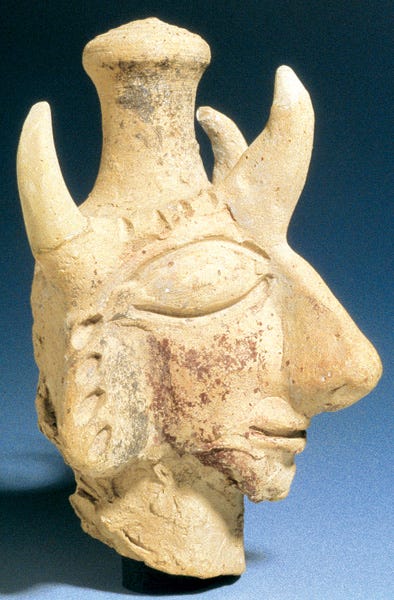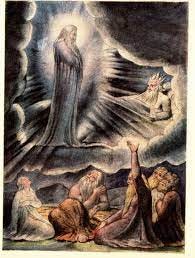It's 2014. I'm at an Academy Awards party with strangers. Ellen DeGeneres is hosting. I am in Hell. Lupita Nyong'o wins for best supporting actress and a woman sitting next to me says “She's so well spoken.” She means it as a compliment. Had I been among friends, I might have told her that she was racist and watch her cry, which would have been much more fun than the Oscars.
Eliphaz the Temanite reminds me of that woman. He means well. He is just too stupid to understand that he's toxic. The Bible is full of rapists, murderers and slave traders, but at least they don't make long clueless speeches. Eliphaz, by contrast, decides that a sermon about divine punishment is the best way to comfort a friend whose children just died.
Even before Eliphaz speaks, the narrative undermines everything he says. First, we have two chapters telling us that Job is innocent. His children are innocent. His skin is innocent. Satan's very existence in this book tells us that when Eliphaz says “what innocent man ever perished” he's engaged in garbage rhetoric.
Second, Eliphaz the Temanite is named after Esav's first son and grandson (Teman). Diplomatic commentators note that he represents Edomite wisdom. Yet, the Edomites were an enemy tribe and the text already depicts their founder, Esav, as a very stupid man. Esav sells his birthright for lentil soup. He can't recognize his mother plotting against him. When Jacob takes his blessing, his best plan is to loudly proclaim his intention to murder Jacob to anyone who would listen.
For the author of Job, Edomite wisdom is a misnomer.
Third, he's talking to a friend in mourning. Even in a version of Job where Job loses everything without Satan and Eliphaz is named Socrates Laozi Einstein, Eliphaz would be hatefully clueless. Perhaps his insistence that Job must have done something to deserve boils and dead children would feel understandable. When bad things happen to people, we want to have a reason. They made poor decisions. They deserved it for punching their grandmother. We don't want to think that bad things happen because bad things happen and we are just as likely to get murdered or catch a flesh eating bacteria as anyone.
One could be sympathetic if only Eliphaz wasn't so toxic. Eliphaz says many things to Job and yet never conveys a hint of empathy.
Chapter 4 has two sections. The first section begins with a “I'm reluctant to speak BUT I'm going to rub your pain in your face.” This includes the very stupid question - why can't Job rely on his integrity and piety? After all, Job has been very generous and comforting to people going through a hard time. So why can't he just draw on that strength when his life is in shambles?
Also, why can't brain surgeons open up their own skulls and take out their tumors?
Then we get the “What innocent man ever perished?” line. This was written long before the doctrine of Original Sin, but the platonic view already was asserting that the world is tainted and everyone is automatically contaminated. The sinful die. The lion breaks his teeth. Eliphaz would sound almost profound if he wasn't talking to a man who was going through the worst tragedy imaginable.
Again, maybe it's not Eliphaz' fault that he's so awful. Not everyone has the emotional strength. I have reached out to friends when I was going through bad times. Some friends were supportive. Others tried to be supportive and failed. None ever told me that I deserved to suffer because I must have done something wrong. I guess I have better friends than Job.
What possesses Eliphaz to respond to a friend in pain with “now that I can talk, we all deserve to die and lions”? Imagine clergy delivering Eliphaz' speech as a funeral sermon. Can you picture that clergy member keeping their job?
The second part is even worse.
Eliphaz is not content to spout his aggressively platonic beliefs at Job. He has to claim a prophetic vision where he hears a whisper, sees a vision, dreams a prophetic dreams, feels the wind, sees a mysterious figure and hears an important murmur. And what does the magic elf say?
It says that Eliphaz is completely right. In fact he's so right that even God agrees with him. Everyone is wicked. Everyone deserves death. God's angels are disappointing so of course, humanity is disappointing. Mortals live in houses of clay and are crushed to dust.
Unfortunately, Eliphaz is just getting started.
Next Week: Eliphaz gets much worse.






![VIDEO] Ellen DeGeneres' Oscar Monologue Mocks Liza Minnelli, Jennifer Lawrence, L.A. Rain – The Hollywood Reporter VIDEO] Ellen DeGeneres' Oscar Monologue Mocks Liza Minnelli, Jennifer Lawrence, L.A. Rain – The Hollywood Reporter](https://substackcdn.com/image/fetch/$s_!qERj!,w_1456,c_limit,f_auto,q_auto:good,fl_progressive:steep/https%3A%2F%2Fsubstack-post-media.s3.amazonaws.com%2Fpublic%2Fimages%2F723b3dc0-9b6e-4bc1-9e27-9ae7f591aab5_1047x1572.jpeg)


